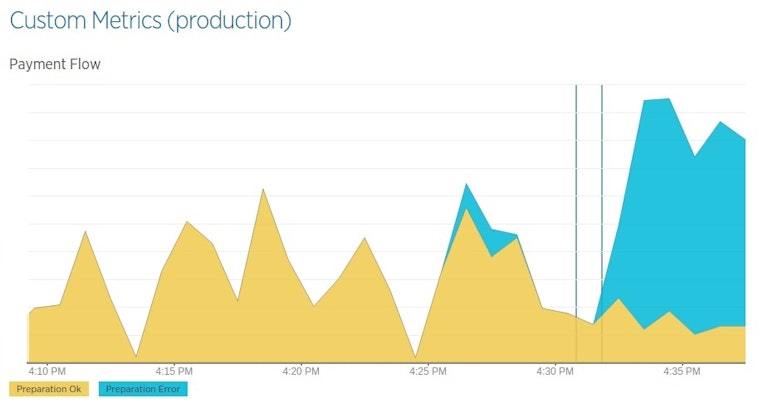Monitoring services and adapters in your Rails app with Honeybadger, NewRelic and #prepend
… and check why 5600+ Rails engineers read also this
Monitoring services and adapters in your Rails app with Honeybadger, NewRelic and #prepend

The bigger your app gets the higher chance that it will need to integrate with multiple of external services, providers and APIs. Sometimes they work, sometimes they don’t. Sometimes it doesn’t matter when they are down or behaving problematically. Sometimes it costs your clients money.
Like when a payment gateway is having problems on Black Friday.

Can you imagine?
But the first step to knowing about the problem and the urgency of a situation is to monitor it. So we will start with that.
Let’s imagine a simple Service Object that is doing something in your app. Something probably important. Perhaps it communicates with a payment gateway to create a new payment. Sounds important enough. The code is probably doing some DB queries, maybe even updates. It might use a gem or an adapter to communicate with an external service. It probably needs to catch some exceptions (especially networking related) in case anything goes wrong and convert them into something expected by the controller.
class Service
Error = Class.new(StandardError)
def call
db.query
adapter.do_something
return whatever
rescue Adapter::Error, OtherKindsOfErrors
raise Error
end
end
Now because this is a crucial part of our shopping application we would like to monitor it in production and respond to troubles.
We could add the monitoring directly to this class, but it would make it less readable. I experimented with two different approaches and both work.
Send events/notifications
You send notifications (for example using standard rails
mechanism such as ActiveSupport::Notifications
) or any other event bus that you use in your app.
class Service
Error = Class.new(StandardError)
def call
db.query
adapter.do_something
ActiveSupport::Notifications.instrument("Service::Ok")
return whatever
rescue Adapter::Error, OtherKindsOfErrors => e
ActiveSupport::Notifications.instrument("Service::Error", error: e)
raise Error
end
end
and you subscribe to them:
# config/initializers/instrumentation.rb
N = ActiveSupport::Notifications
N.subscribe("Service::Error") do |_name, _start, _finish, _id, payload|
NewRelic::Agent.increment_metric('Custom/Service/Error')
Honeybadger.notify(payload.fetch(:error))
end
N.subscribe("Service::Ok") do |_name, _start, _finish, _id, _payload|
NewRelic::Agent.increment_metric('Custom/Service/Ok')
end
This almost works, but I noticed that for New Relic to actually handle those metrics
I had to made sure #increment_metric it is called from the inside of a directly
traced code:
# config/initializers/instrumentation.rb
require 'new_relic/agent/method_tracer'
Service.class_eval do
include NewRelic::Agent::MethodTracer
instance_method(:call) or raise "Instrumentation broken for #call"
add_method_tracer :call, 'Custom/Service/call'
end
Using #prepend (AOP style)
Since Ruby 2.0 we have the ability to use #prepend as a way to enrich the
behavior of our classes with mixins that can call the original method definition
with super. It’s not as powerful as aspect-oriented programming, but it will suffice in our case.
The module that you prepend can be an anonymous one.
Service.class_eval do
instance_method(:call) or raise "Instrumentation broken for #call"
prepend(Module.new do
include NewRelic::Agent::MethodTracer
def call
super.tap do
NewRelic::Agent.increment_metric('Custom/Service/Ok')
end
rescue => error
NewRelic::Agent.increment_metric('Custom/Service/Error')
Honeybadger.notify(error)
raise
end
add_method_tracer :call, 'Custom/Service/call'
end)
end
In this case, the whole instrumentation and NewRelic / Honeybadger instrumentation is kept
inside the anonymous module.
Safety precautions
I like to use Service.class_eval instead of class Service because the former
won’t work if Service class is not defined in your codebase. Whereas the latter
expression would quietly just define the class for you.
I also check if the method #call is defined in the class with instance_method(:call)
just to make sure we are not instrumenting unexisting method anymore.
We don’t have the benefit of a compiler to check for it in Ruby unfortunately and
add_method_tracer does not verify it either.
Decorator
There is a great keynote 8 Lines of Code by Greg Young worth watching. The examples are not in Ruby but there are only 8 lines of code so you will be able to understand everything without a problem most likely.
Why bother?
Such probes make it easier for you to have an insight into the internals of your system. You can use them for crucial adapters and service to keep an eye on how things are going. The next step is after monitoring is to have alerts and team how can fix the problems.
In case of the problems that we detected with our payment gateway we were capable of switching it to a different one using the Feature Toggle implementation that I showed you in Rolling back complex apps
class PaymentGatewaySetting < ActiveRecord::Base
SettingNotFound = Class.new(StandardError)
def self.fetch(country_id:, merchant_id:, product_id:)
where(
country_id: country_id,
merchant_id: [nil, merchant_id],
product_id: [nil, product_id],
).order("
COALESCE(product_id, 0) desc,
COALESCE(merchant_id, 0) desc,
country_id desc
").first || raise SettingNotFound
end
end
About 30 minutes later they managed their problems and we could switch back.
Stay tuned
This blog-post was inspired by Responsible Rails. A book in which we show you how to handle fuckups and be a more responsible developer.
If you liked reading this you can subscribe to our newsletter below and keep getting more useful tips.